![[object Object],[object Object]](https://cdn.sanity.io/images/tsza235h/production/a3c3fbb680604911d7db5d002dea2fb3d989bd74-1200x711.jpg?rect=0%2C19%2C1200%2C675&w=3840&h=2160&fit=max&auto=format)
Противоречия общественного мнения об Арктике: между стратегической важностью и «бережливым развитием»
Что россияне думают об Арктике? И почему поддерживают взаимоисключающие действия в регионе? Рассказываем про результаты совместного опроса «Арктиды» и Russian Fields .
11 марта глава Минвостокразвития Алексей Чекунков заявил: «Россия продолжает историческую миссию бережного и сбалансированного развития этих стратегически важных для нашей страны территорий».
Действительно, Россия развивает регион. Согласно статистике производства за 2023 год, Арктика «даёт» 85% природного газа, добытого в России. А огромные цифры по загрузке Северного морского пути (80 млн тонн при фактических 37.9 млн тонн), зафиксированные в государственных документах и предполагающие запуск крупных инфраструктурных проектов в регионе, говорят о желании по максимуму использовать ресурсы Арктики.
Однако растущая промышленная нагрузка на фундаментальном уровне противоречит идее сбалансированного развития и ставит под угрозу планы сохранения хрупкой арктической природы.
Противоречие между желанием добывать ресурсы и «бережным развитием» встречается не только на уровне государственной политики в отношении к Арктике, но и в рамках восприятия региона россиянами. Об этом свидетельствует опрос общественного мнения, проведенного «Арктидой» и Russian Field в феврале 2025 года. Рассказываем о его результатах и разбираемся в главных противоречиях.
Россияне всё больше узнают об Арктике, но чаще всего благодаря милитаристской повестке
Согласно опросу, россияне стали чаще интересоваться Арктикой: на проблемы региона в медиа обращают внимание 56% респондентов (это на 12% больше, чем в декабре 2023 года). При этом респонденты с более милитаристской позицией — они бы не стали отменять решение о начале СВО, если бы такая возможность была — чаще остальных встречали упоминание Арктики — таких 67%.
Почти треть опрошенных связывают упоминания об Арктике с политикой и военной тематикой — это на 21% больше, чем в 2023 году. Тогда лишь 9% замечали в медиа геополитический контекст, а 15% — научные исследования.
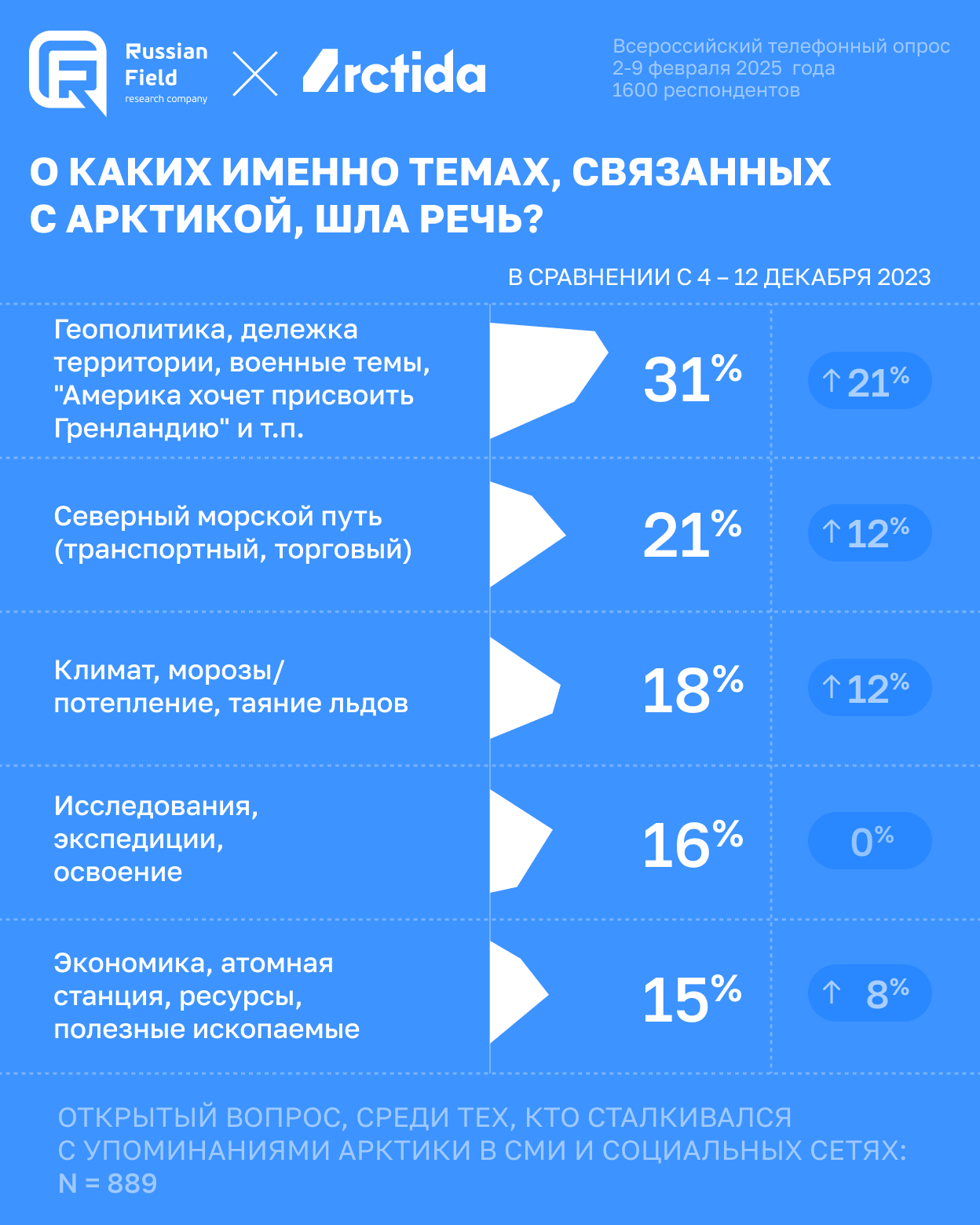
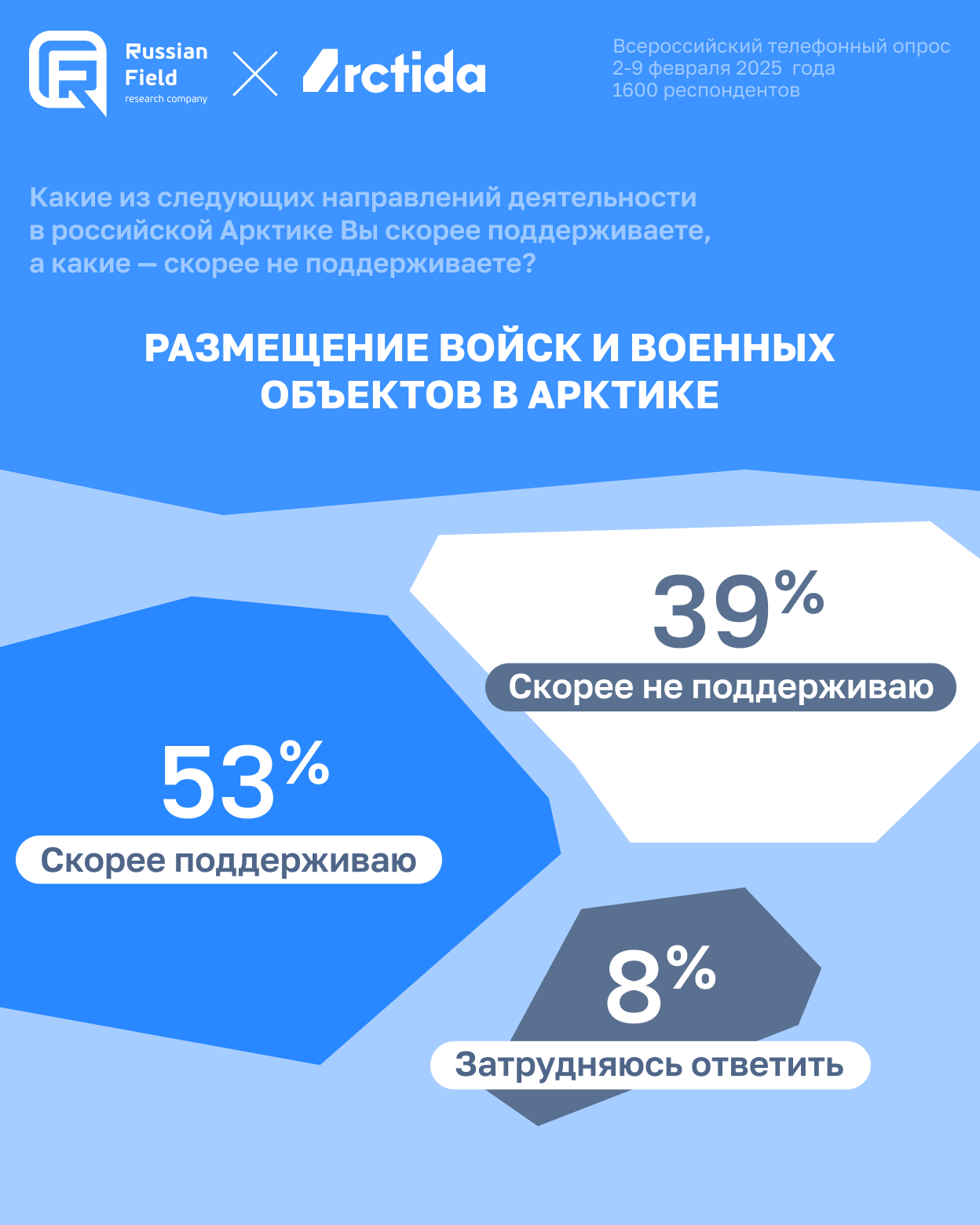
Растет количество людей, выступающих против военного присутствия в регионе, но большинство по-прежнему поддерживает милитаризацию
Доля россиян, выступающих против размещения войск и военных объектов в Арктике, выросла на 4% по сравнению с декабрём 2023 года и достигла 39%. При этом количество опрошенных, одобряющих милитаризацию в Арктическом регионе, осталось на прежнем уровне — 53%. Разумеется, за военное присутствие выступают чаще те, кто не стал бы отменять СВО в прошлом.
Россияне хотят видеть Арктику территорией сотрудничества
Более половины россиян (55%) считают, что Арктика сегодня — это территория диалога, стабильности и конструктивного сотрудничества, а 79% респондентов поддерживают развитие сотрудничества с другими странами в Арктике. Причем доля поддерживающих значимо возросла (на 10%) в сравнении с результатом прошлого опроса.
Чаще всего Арктику как территорию сотрудничества воспринимают респонденты до 30 лет, а также те, кто отменил бы СВО в прошлом. Реже такую идею поддерживают люди без высшего образования и с низким доходом.
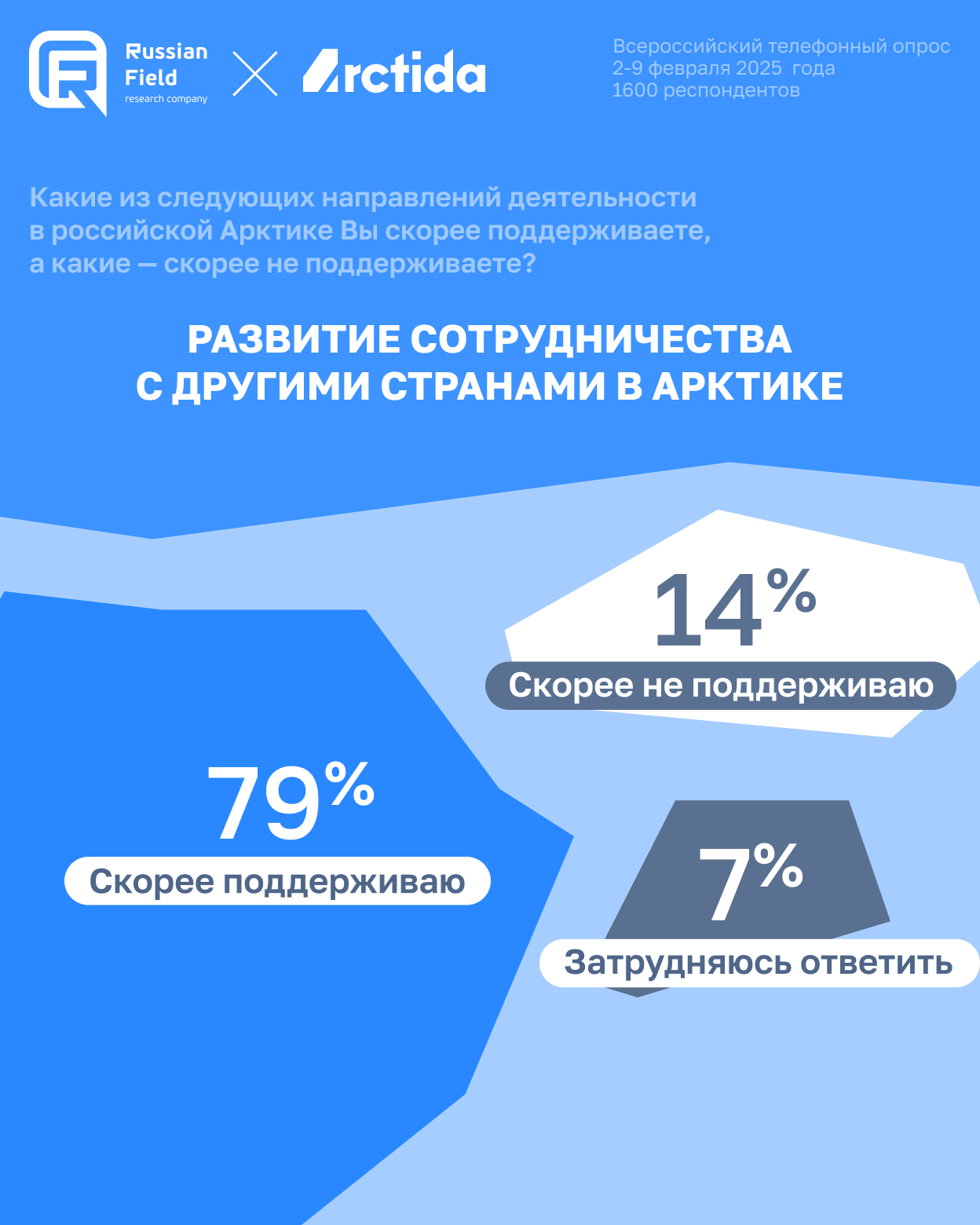
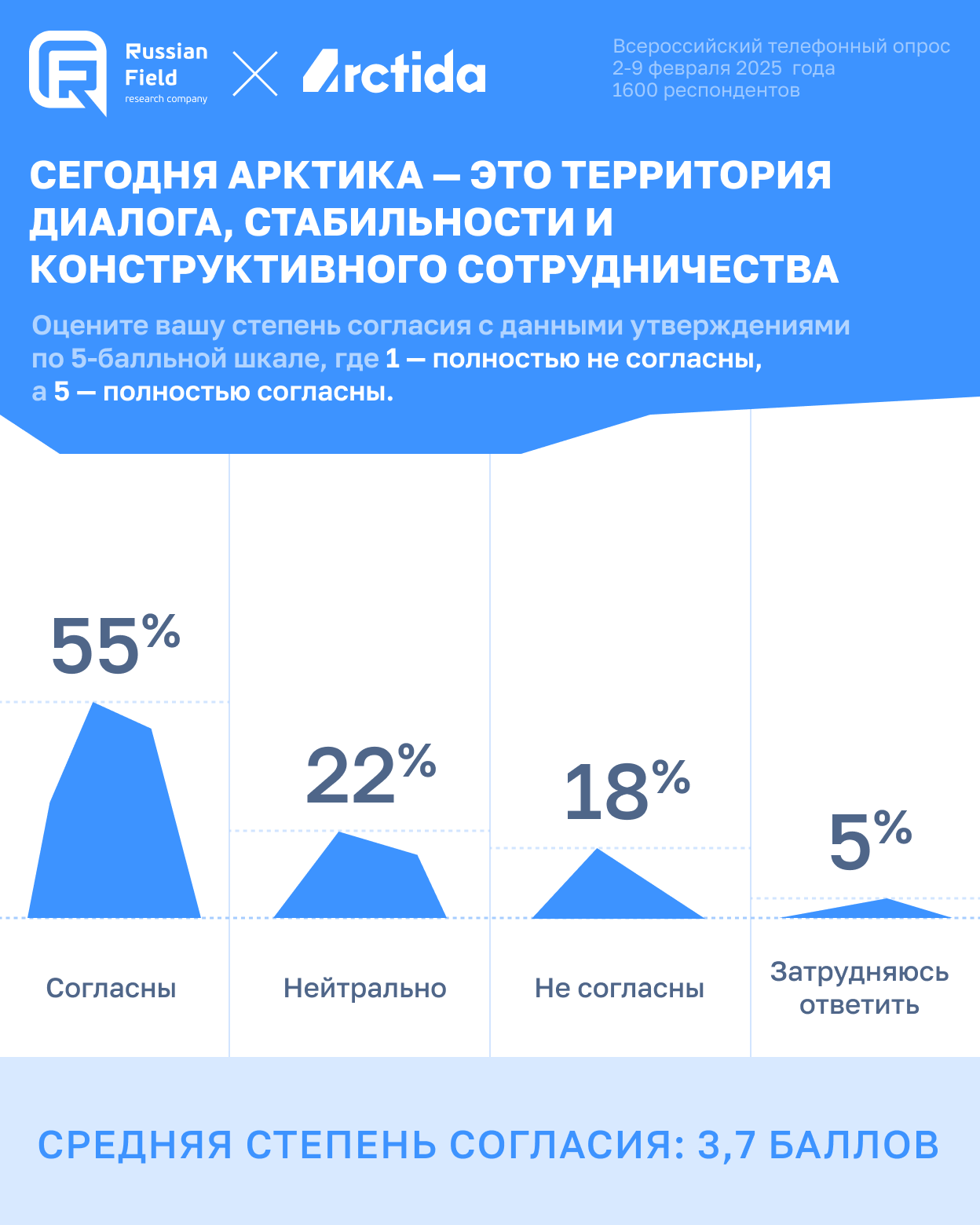
Большинство воспринимают Арктику как стратегический ресурс
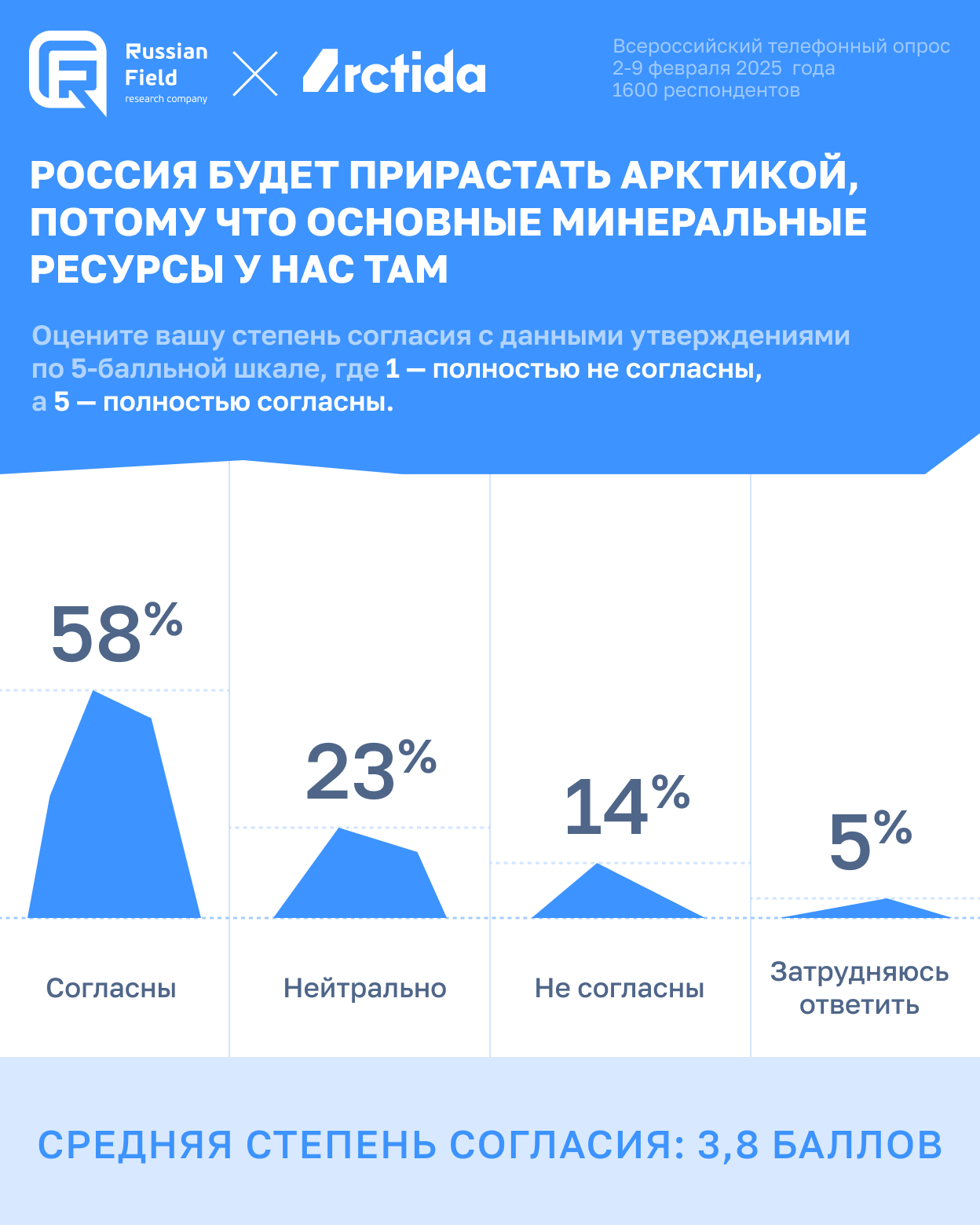
В 2024 году на Петербургском экономическом форуме Президент Путин заявил, что «Россия будет прирастать и Арктикой, потому что основные минеральные ресурсы у нас там» — с ним согласны 58% опрошенных. Согласно опросу, наиболее чувствительны к такой риторике люди старше 60 лет, не имеющие высшего образования, а также разделяющие милитаристские настроения.
Экология против добычи
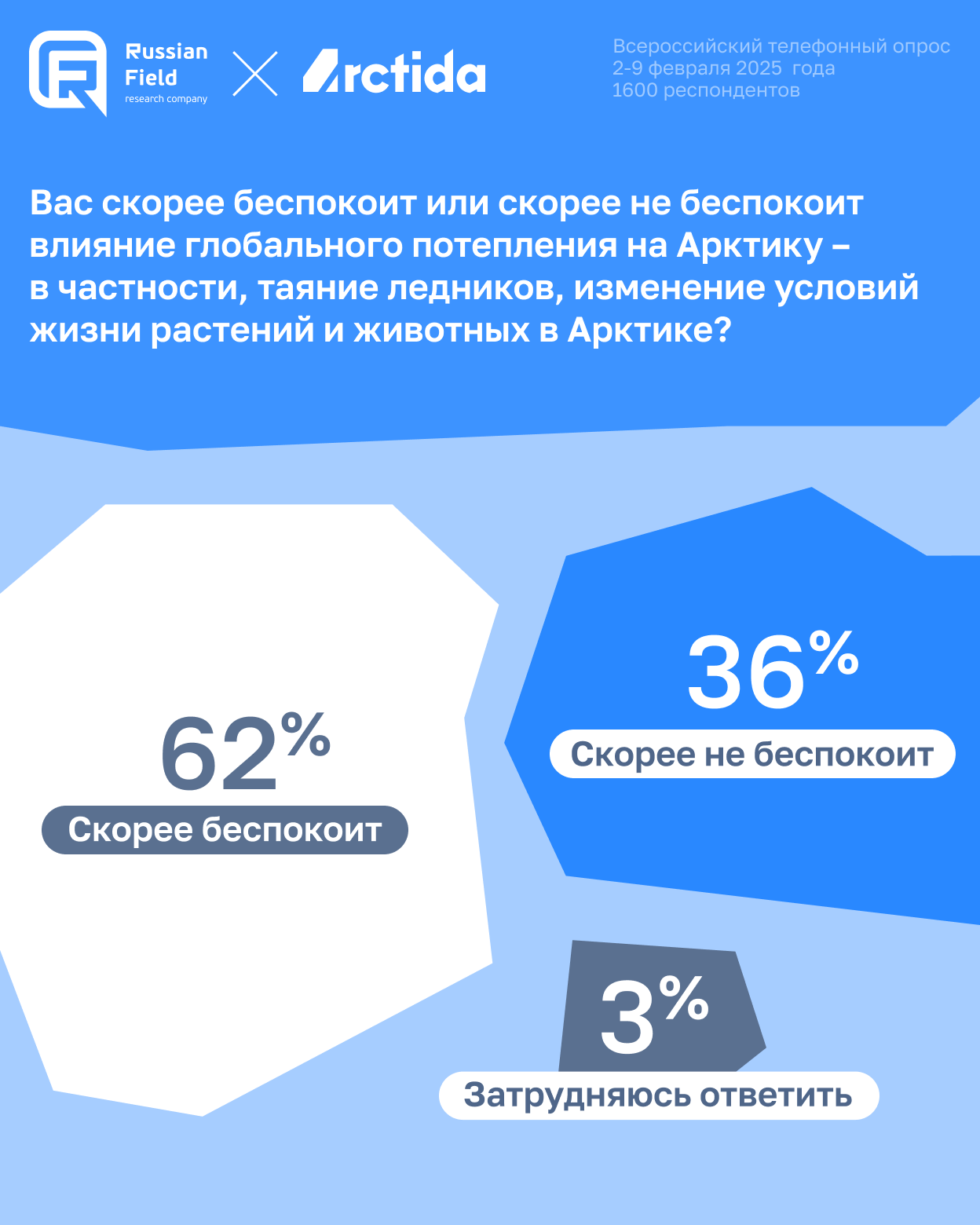
Несмотря на то что в риторике государства Арктика чаще всего ассоциируется с добычей ресурсов, всё больше россиян обеспокоены экологией региона.
По данным опроса «Арктиды» и Russian Field, 86% россиян поддерживают меры по минимизации негативных экологических последствий — это на 9% больше, чем в декабре 2023 года. Растёт и обеспокоенность глобальным потеплением (62% против 55% в 2023 году).
При этом большинство респондентов (68%) по-прежнему поддерживают добычу нефти и газа в Арктике. Однако на фоне экологических инцидентов, таких как разлив нефтепродуктов, число противников добычи постепенно растёт — с 21% до 25% за полтора года.
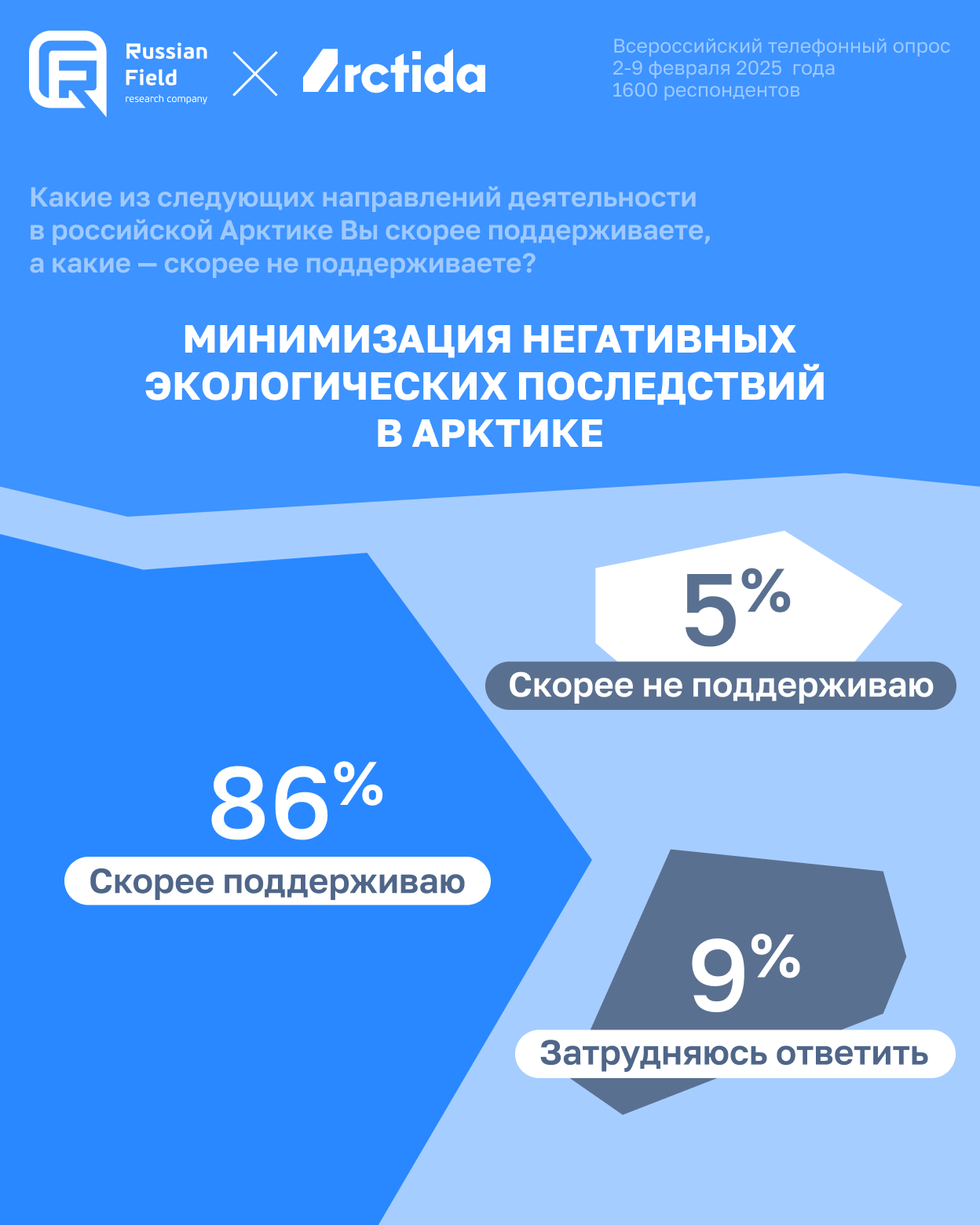
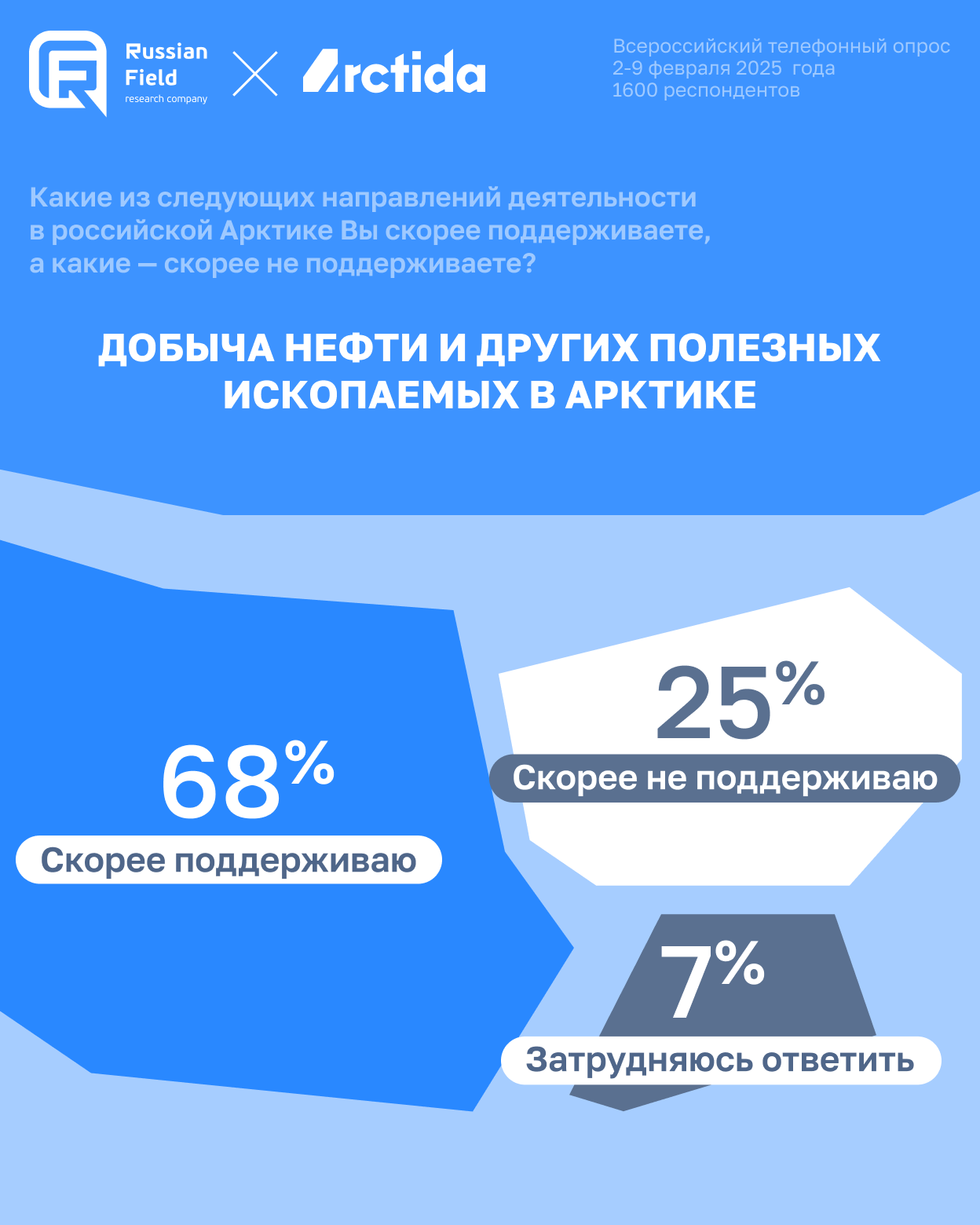
Феномен ошибки согласия: как объяснить противоречивые результаты опроса?
Как получается, что с одной стороны, люди выступают за активную добычу ресурсов и защиту экологии, с другой — за развитие международного сотрудничества и милитаризацию?
«Исследователи объясняют это бессознательной склонностью людей соглашаться с высказываниями авторитетных фигур — в таком качестве могут восприниматься, например, интервьюеры, проводящие опрос».
Этот феномен известен как ошибка согласия (agreement bias), и, по словам Ильи Дороханова, часто встречается, когда зачитываемые утверждения воспринимаются как очевидные, соответствующие социальным нормам и здравому смыслу — а ведь и добыча ресурсов важна для экономики, и природу нужно защищать, и войска обеспечивают безопасность, а международное сотрудничество полезно.
«То, что эти направления развития могут противоречить друг другу, мало что меняет, — рассказывает Илья Дорханов, — Во-первых, ошибка согласия подталкивает людей к тому, чтобы соглашаться с каждым утверждением в отдельности, потому что каждое из них звучит в целом позитивно. Во-вторых, могут противоречить — это ещё не значит, что противоречат. Скажем, та же нефтедобыча может (хотя бы в теории) проводиться с соблюдением всех норм по защите природы, а сотрудничество с одними странами в Арктике не исключает размещения там войск для обороны от других».
Россияне мало знают об Арктике
Социолог Илья Дорханов отмечает, что противоречия в ответах могут быть связаны и с отсутствием знаний о регионе.
«Возможно, респонденты, не будучи глубоко погруженными в арктическую проблематику, склонны проявлять некоторую мечтательность и оптимизм, поддерживать все идеи, которые им кажутся хорошими, в надежде, что их все получится как-то реализовать и согласовать», — объясняет эксперт.
Действительно, одновременная поддержка противоречивых действий в Арктике может указывать на то, что в коллективных представлениях не хватает знаний, позволяющих связать экономическое освоение и милитаризацию региона с их экологическими последствиями. Общественное мнение об Арктике не просто противоречиво, оно кажется и не сложилось.
Несмотря на то что Арктика будто бы все больше будоражит общественность, массовое знание о ней по-прежнему лишено сложности.
Так, отвечая на открытый вопрос о том, что такое Арктика, более трети упомянули стереотипные образы из географии, связанные с суровыми природными условиями. Такие представления органично сочетаются с ресурсной риторикой освоения и развития.
На этом фоне может показаться удивительным, что 63% респондентов считают, что именно коренные народы должны в наибольшей степени определять судьбу Арктики. Однако и этот факт отражает скорее стереотипные представления о регионе, нежели осознание важности смены управленческой парадигмы.
Что почитать, чтобы начать лучше понимать Арктику?
«Арктида» проводит исследования и расследования, связанные с российской Арктикой и регулярно публикует материалы о регионе. Вот несколько важных текстов:
- Статья о том, как три года военных действий в Украине отразились на жизни в Арктике.
- Расследование о превращении Ассоциации коренных малочисленных народов в инструмент обогащения и лоббизма.
- Исследование о главных стейкхолдерах российской арктической политики.
- Репортаж о разрушительном воздействии угольного бизнеса на природу Чукотки.
Фото обложки: Афанасий Маковнев / GeoPhoto



